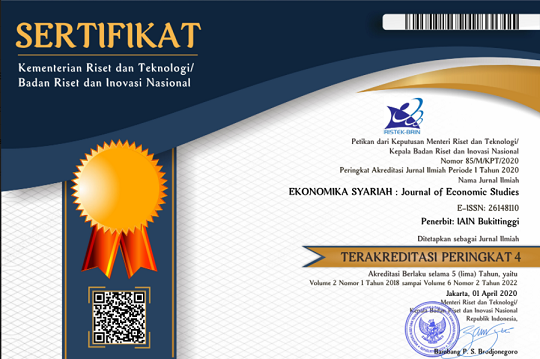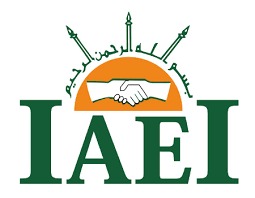Realizing Sustainable Development In Indonesia Through Economic Growth Priorities: Empirical Evidence Vector Error Correction Model (VECM)
DOI:
https://doi.org/10.30983/es.v8i1.8590Abstract
Indonesia's journey towards sustainable economic development is closely intertwined with global issues in female labor force participation, environmental policy, and geopolitical dynamics. This study analyzes the causal relationship between economic growth, geopolitical risk, the female labor force, and environmental policy rigor in Indonesia. The data type used is a time series starting in 1992–2022, and it uses the Vector Error Correction Model (VECM) econometric model to identify the causal relationship and reveal the long-run and short-run effects between variables. The results of the analysis show that there is a one-way relationship between geopolitical risk and the female labor force. While the long-run test results show that the female labor force, geopolitical risk, and environmental policy have a significant impact on economic growth, The findings also reveal that there is a short-term effect between environmental policy stringency and economic development. This study emphasizes the importance of holistic and integrative policy formulation by considering the interaction of economic growth, women's participation in the workforce, environmental policy, and geopolitical risk to achieve sustainable development. By examining the causality and interdependence of the complex dynamics occurring in the socio-economic landscape, policymakers are expected to promote inclusive growth, consider environmental aspects, and be sensitive to geopolitical challenges in Indonesia's development trajectory.
References
Abbasi, Kashif Raza, Qingyu Zhang, Badr Saad Alotaibi, Mohammed Awad Abuhussain, and Rafael Alvarado. 2024. “Toward Sustainable Development Goals 7 and 13: A Comprehensive Policy Framework to Combat Climate Change.” Environmental Impact Assessment Review 105: 107415.
Abu Murad, Malak Samih, and Nooh Alshyab. 2019. “Political Instability and Its Impact on Economic Growth: The Case of Jordan.” International Journal of Development Issues 18 (3): 366–80. https://doi.org/10.1108/IJDI-02-2019-0036.
Acemoglu, Daron. 2012. “Introduction to Economic Growth.” Journal of Economic Theory 147 (2): 545–50. https://doi.org/10.1016/j.jet.2012.01.023.
Akadiri, Seyi Saint, Kayode Kolawole Eluwole, Ada Chigozie Akadiri, and Turgay Avci. 2020. “Does Causality between Geopolitical Risk, Tourism and Economic Growth Matter? Evidence from Turkey.” Journal of Hospitality and Tourism Management 43: 273–77.
Akhtar, Rulia, Muhammad Mehedi Masud, Nusrat Jafrin, and Sharifah Muhairah Shahabudin. 2023. “Economic Growth, Gender Inequality, Openness of Trade, and Female Labour Force Participation: A Nonlinear ARDL Approach.” Economic Change and Restructuring 56 (3): 1725–52.
Al-Jayyousi, Odeh. 2018. “How Islam Can Represent a Model for Environmental Stewardship.” UN Environment Programme. 2018. https://www.unep.org/news-and-stories/story/how-islam-can-represent-model-environmental-stewardship.
Angelis, Enrico Maria de, Marina Di Giacomo, and Davide Vannoni. 2019. “Climate Change and Economic Growth: The Role of Environmental Policy Stringency.” Sustainability 11 (8): 2273.
Appiah, Elizabeth N. 2018. “Female Labor Force Participation and Economic Growth in Developing Countries.” Global Journal of Human-Social Science: E Economics 18 (2): 175–92. http://wol.iza.org/articles/female-labor-force-participation-in-developing-countries.
Arie, Musa Asy’. 2015. Filsafat Ekonomi Islam. I. Yogyakarta: Lembaga Studi Filsafat Islam.
Arjomandi, Amir, Hassan F Gholipour, Reza Tajaddini, and Charles Harvie. 2023. “Environmental Expenditure, Policy Stringency and Green Economic Growth: Evidence from OECD Countries.” Applied Economics 55 (8): 869–84.
Balsalobre-Lorente, Daniel, Tugba Nur, Emre E Topaloglu, and Ceren Evcimen. 2024. “The Dampening Effect of Geopolitical Risk and Economic Policy Uncertainty in the Linkage between Economic Complexity and Environmental Degradation in the G-20.” Journal of Environmental Management 351: 119679.
Bappenas. 2023. “Indonesia Emas 2045 Rancangan Akhir RPJPN 2025-2045.” Kementerian PPN/Bappenas. 2023. https://indonesia2045.go.id/.
Bokhari, Syed Asad Abbas, Muhammad Aftab, and Manzoor Shahid. 2021. “Political Instability and Inward Foreign Direct Investment: The Perspective of Government Corruption from an Emerging Economy.” Industry Promotion Research 6 (4): 69–81.
Boserup, Ester. 1970. “Women’s Role in Economic Development. St.” Martins, New York.
Botta, Enrico, and Tomasz Koźluk. 2014. “Measuring Environmental Policy Stringency in OECD Countries.” OECD Economics Department Working Papers No. 1177, no. 1177: 47.
Caldara, Dario, and Matteo Iacoviell. 2022. Measuring Geopolitical Risk. American Economic Review. Vol. 112. https://doi.org/10.1257/aer.20191823.
Dechezleprêtre, Antoine, and Misato Sato. 2017. “The Impacts of Environmental Regulations on Competitiveness.” Review of Environmental Economics and Policy 11 (2): 183–206. https://doi.org/10.1093/reep/rex013.
Dogan, Eyup, Muhammad Tariq Majeed, and Tania Luni. 2021. “Analyzing the Impacts of Geopolitical Risk and Economic Uncertainty on Natural Resources Rents.” Resources Policy 72: 102056.
Gade, Anna M. 2023. “‘Muslim Environmentalisms and Environmental Ethics: Theory and Practice for Rights and Justice.’” Muslim World 113 (3): 242–59. https://doi.org/10.1111/muwo.12474.
Grossman, Gene M, and Alan B Krueger. 1991. “Environmental Impacts of a North American Free Trade Agreement.” National Bureau of economic research Cambridge, Mass., USA.
Hahn, Rüdiger. 2012. “Inclusive Business, Human Rights and the Dignity of the Poor: A Glance beyond Economic Impacts of Adapted Business Models.” Business Ethics: A European Review 21 (1): 47–63.
Hirai, Tadashi. 2022. “A Balancing Act between Economic Growth and Sustainable Development: Historical Trajectory through the Lens of Development Indicators.” Sustainable Development 30 (6): 1900–1910.
Indriso, Cynthia, and Women S Work. 1986. “Women ’ S Work and Child,” no. February 1987: 1–55.
Jafari, Yaghoob, Jamal Othman, and Abu Hassan Shaari Mohd Nor. 2012. “Energy Consumption, Economic Growth and Environmental Pollutants in Indonesia.” Journal of Policy Modeling 34 (6): 879–89. https://doi.org/10.1016/j.jpolmod.2012.05.020.
Jajang, Nur Rianto, Tika Widiastuti. 2021. Ekonomi Pembangunan Islam. Jakarta: Bank Indonesia.
Jalamneh, Ammar, Saeed Hameed Aldulaimi, Mohammed Yousif, Abo Keir, and M Marwan. 2024. “Sustainable Environment in Islam , Its Manifestations and Causes” 3538 (10): 2637–50.
Kapopoulos, Theodore, Athanasios Sakkas, and Konstantinos Drakos. 2024. “Geopolitical Risk and Foreign Direct Investment Inflows: The Moderating Role of Water and Energy Risks.” Available at SSRN 4756396.
Kirikkaleli, Dervis. 2020. “Does Political Risk Matter for Economic and Financial Risks in Venezuela?” Journal of Economic Structures 9 (1). https://doi.org/10.1186/s40008-020-0188-5.
Kusumawardhani, Niken, Rezanti Pramana, Nurmala Selly Saputri, and Daniel Suryadarma. 2023. “Heterogeneous Impact of Internet Availability on Female Labor Market Outcomes in an Emerging Economy: Evidence from Indonesia.” World Development 164: 106182. https://doi.org/10.1016/j.worlddev.2022.106182.
Li, Hua, Muhammad Sibt e Ali, Bakhtawer Ayub, and Irfan Ullah. 2023. “Analysing the Impact of Geopolitical Risk and Economic Policy Uncertainty on the Environmental Sustainability: Evidence from BRICS Countries.” Environmental Science and Pollution Research, 1–15.
Martos, A, Rosalía Pacheco-Torres, J Ordóñez, and E Jadraque-Gago. 2016. “Towards Successful Environmental Performance of Sustainable Cities: Intervening Sectors. A Review.” Renewable and Sustainable Energy Reviews 57: 479–95.
Miranti. 2022. “Angkatan Kerja Perempuan Masih Rendah, Menaker: Budaya Patriarki Masih Mengakar.” Kompas.Com. 2022. https://money.kompas.com/read/2022/07/29/210000426/angkatan-kerja-perempuan-masih-rendah-menaker--budaya-patriarki-masih-mengakar.
Murshed, Muntasir, Md Aminur Rahman, Md Shabbir Alam, Paiman Ahmad, and Vishal Dagar. 2021. “The Nexus between Environmental Regulations, Economic Growth, and Environmental Sustainability: Linking Environmental Patents to Ecological Footprint Reduction in South Asia.” Environmental Science and Pollution Research 28 (36): 49967–88.
Nasir, Muhammad Ali, and David Spencer. 2024. “War‐associated Geopolitical Risks and Uncertainty: Implications for Real Wages.” International Journal of Finance & Economics.
Natalegawa, Mohammad R. Marty M. 2021. “Geopolitik Dan Perekonomian Indonesia,” 1–295. www.bi.go.id/id/bi-institute.
Nguyen, Dinh Trung, Thai Hong Le, Dinh Dinh Do, and Hai Nam Nguyen. 2023. “Does Geopolitical Risk Hinder Sustainable Development Goals? Evidence from a Panel Analysis.” Journal of Environmental Management 347: 119204.
Okafor, Godwin. 2017. “The Impact of Political Instability on the Economic Growth of ECOWAS Member Countries.” Defence and Peace Economics 28 (2): 208–29. https://doi.org/10.1080/10242694.2015.1092206.
Pampel, Fred C., and Kazuko Tanaka. 1986. “Economic Development and Female Labor Force Participation: A Reconsideration.” Social Forces 64 (3): 599–619. https://doi.org/10.1093/sf/64.3.599.
Putri, Selly Febriana. 2020. “Hubungan Pembangunan Ekonomi Terhadap Kualitas Lingkungan Hidup Di Provinsi Jawa Timur.” Jurnal Dinamika Ekonomi Pembangunan 2 (2): 58. https://doi.org/10.14710/jdep.2.2.58-70.
Qin, Meng, Chi-Wei Su, Muhammad Umar, Oana-Ramona Lobonţ, and Alina Georgiana Manta. 2023. “Are Climate and Geopolitics the Challenges to Sustainable Development? Novel Evidence from the Global Supply Chain.” Economic Analysis and Policy 77: 748–63.
Rois, Choirur, and Farhan Masrury. 2023. “Fiqih Al-Ḥaḍarah Perspektif Geopolitik: Gagasan Diplomasi Perdamaian NU Melalui Rekontekstualisasi Fiqih Siyasah.” An-Nida’ 47 (1): 60. https://doi.org/10.24014/an-nida.v47i1.25330.
Shihab, Quraish. 2023. Islam & Ligkungan. 1st ed. Tanggerang: Lentera Hati.
Singer, H W. 1976. “The Labor Force in Economic Development. A Comparison of International Census Data 1946-1966.” The Economic Journal 86 (343): 640–42.
Sinha, Jania N. 1965. Dynamics of Female Participation in Economic Activity in a Developing Economy.
Soybilgen, Barış, Huseyin Kaya, and Dincer Dedeoglu. 2019. “Evaluating the Effect of Geopolitical Risks on the Growth Rates of Emerging Countries.” Economics Bulletin 39 (1): 717–25.
Sudarmawan, Barianto Nurasri. 2022. “The Correlation of International Trade and Growth in Indonesia.” Jurnal Ekonomi Dan Pembangunan 30 (1): 31–46.
Sweidan, Osama D. 2016. “Political Instability and Economic Growth: Evidence from Jordan.” Review of Middle East Economics and Finance 12 (3): 279–300. https://doi.org/10.1515/rmeef-2015-0025.
Taheri, Elham, Fatma Güven Lisaniler, and Cem Payaslioğlu. 2021. “Female Labour Force Participation: What Prevents Sustainable Development Goals from Being Realised in Iran?” Sustainability 13 (21): 11918.
Tsani, Stella, Leonidas Paroussos, Costas Fragiadakis, Ioannis Charalambidis, and Pantelis Capros. 2013. “Female Labour Force Participation and Economic Growth in the South Mediterranean Countries.” Economics Letters 120 (2): 323–28. https://doi.org/10.1016/j.econlet.2013.04.043.
UN DESA. 2023. “SDGs Report 2023.” The Sustainable Development Goals Report 2023: Special Edition. https://unstats.un.org/sdgs/report/2023/.
UN Women. 2021. “PROGRESS ON THE SUSTAINABLE DEVELOPMENT GOALS THE GENDER SNAPSHOT 2021 31 Hours 5 Hours More Almost Half.”
United States Enviromental Protection Agenchy. 2023. “Global Emissions by Gas.” EPA. 2023. https://www.epa.gov/ghgemissions/global-greenhouse-gas-emissions-data.
Wangke, Humphrey. 2021. Diplomasi Digital Dan Kebijakan Luar Negeri Indonesia. Yayasan Pustaka Obor Indonesia.
Downloads
Published
How to Cite
Issue
Section
Citation Check
License
Copyright (c) 2024 Basri Basri, Laras Aisah, abdullah alief

This work is licensed under a Creative Commons Attribution-ShareAlike 4.0 International License.
Authors who publish with this journal agree to the following terms:
- Authors retain copyright and grant the journal right of first publication with the work simultaneously licensed under a Creative Commons Attribution-ShareAlike 4.0 International License that allows others to share the work with an acknowledgment of the work's authorship and initial publication in this journal.
- Authors are able to enter into separate, additional contractual arrangements for the non-exclusive distribution of the journal's published version of the work (e.g., post it to an institutional repository or publish it in a book), with an acknowledgment of its initial publication in this journal.
- Authors are permitted and encouraged to post their work online (e.g., in institutional repositories or on their website) prior to and during the submission process, as it can lead to productive exchanges, as well as earlier and greater citation of published work (See The Effect of Open Access).




